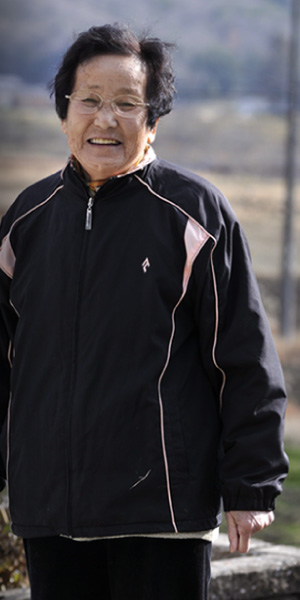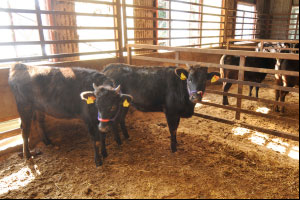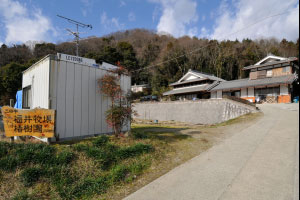- Carrying on the Wishes of Her Late Husband
- The Fukui Farm is located at Mt. Myogadani-yama in the northern part of Mita City neighboring on Kobe. Takeko Fukui’s small cowshed stands erect on the steep mountain slopes as if to give a commanding view of the tranquil rustic scenery spreading about it.
Takeko chuckles as she tells us, “After the ‘Kyorei Kai’ Cattle Show, people called to congratulate me on the award. I was absolutely taken aback because I little expected that it would turn out that way.” The Kobe beef that she’d submitted for judging had been ranked A5-12—an outstanding achievement.
Takeko learnt how to look after cows the traditional way by looking and imitating while helping her late husband raise beef cows, the business that he started about 20 years ago. She recalls that, at around this time, her husband was given a lot of wooden telephone poles that were no longer needed as a result of the country-wide switchover to concrete poles, and used these to build the cowshed single-handedly. Her husband, too, was well-known in the local community as a producer of fine-quality beef. She is often complimented that “Grandpa is probably happy in Heaven to see grandma winning the prize he was unable to win.” - An Abundant Natural Environment and the Power of Love and Affection
- In fact, a little before this 160th “Kyorei Kai” Cattle Show, Takeko had reared two A5 class beef cows for two straight years on the run, which resulted in her being regarded with awe and amazement by those around her. Even so, she still remains the very picture of modesty, and adds “I suppose this was all possible thanks to love and affection, environment and water. Otherwise, what else could an old person such as myself without any skills to mention expect to achieve.”
Water is drawn from underground aquifers deep under Mt. Myogadani-yama. Straw is collected from the local paddy fields. And, the cows are reared in the embrace of Takeko’s warm love and affection in an environment blessed with cool mountain shade from early afternoon onwards even in midsummer. In the case of the prize cows, in particular, Takeko used to enter the stalls in the cowshed every day from around a month before the cattle show to actually touch them and to communicate and share her feelings with them. Her family was worried that she might be kicked by the cows and tried to put a stop to this. But, Takeko says, “They love it if I stroke or scratch their backs, and play up to me as if to ask for more.”
“Even my son praises me on how well I can handle the cows, ‘Ma, you always amaze me. When anyone else enters the cowshed, the cows sense this and walk around unsettled and at edge. But when you go up to them, they start to play up to you’”. - Finding a New Purpose in Life in Raising Cattle
- Takeko wears her 81 years very lightly. In the fall of last year, she decided to buy and raise two more new calves. “This means that I have to work hard at it for another two more years, doesn’t it!” she says through a big grin. As you would expect, it appears that the exercise she gets by moving around every day to look after her dear cows is the secret to her good health. She also adds that her university student grandson is helping her with work on the farm.
“Grandpa used to sit him on the farm machinery when he was a little lad in elementary school, and always took him wherever he went saying that this was how he should start to be taught. Now, he’s grown up and helping me out a lot.” Takeko’s grandson, her pride and joy, made a sign for the Fukui Farm. From where that sign stands, rearing another champion cow now seems less of an idle fancy.
 Takeko’s bashful, sweet smiling face leaves us all with a lasting impression. The mild disposition of all of her cows is without doubt due to her love and compassion.
Takeko’s bashful, sweet smiling face leaves us all with a lasting impression. The mild disposition of all of her cows is without doubt due to her love and compassion.














![[Fukui Farm]Takeko Fukui](img/2010-04.gif)